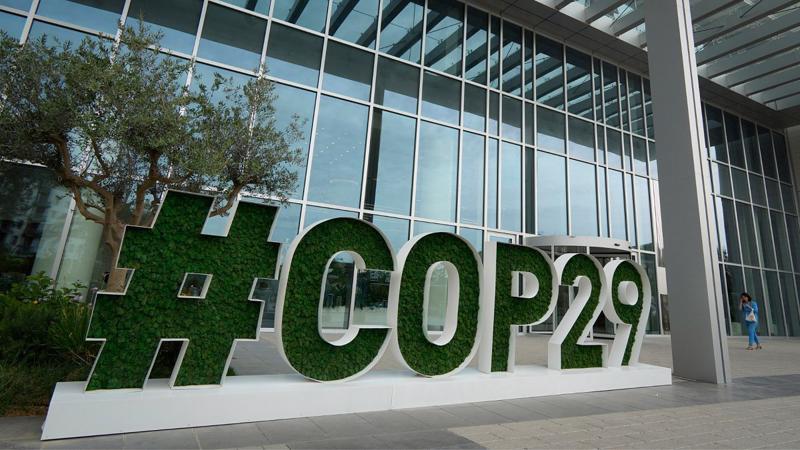The 2024 United Nations Climate Change Conference of the Parties (COP29), held in Baku, Azerbaijan, from November 11 to 24, was a key event in the global effort to address climate change. The conference focused on discussions and financial commitments to help developing countries reduce emissions and adapt to climate change impacts. The climate finance agreement, which was approved on November 24, 2024, marked a significant milestone but also stirred controversy.
Contentious deal
A climate finance agreement was reached at COP29, pledging $300 billion annually to developing countries, with a long-term goal of $1.3 trillion. Mr. Avinash Persaud, a climate finance expert at the Inter-American Development Bank, said the agreement struck a balance between what was politically achievable in developed countries and what could make a meaningful impact in developing countries. Professor Ottmar Edenhofer, a climate economist at the Potsdam Institute for Climate Impact Research, emphasized that the key achievement of the agreement was its approval, which avoided a diplomatic disaster.
However, according to The Guardian, many countries argued that the amount was too low to meet actual needs for emissions reductions and addressing the climate crisis. Ms. Chandni Raina, India’s negotiator, called the agreement “insufficient” and criticized the process, claiming it was “rigged” and failed to follow the consensus approach outlined by the United Nations Framework Convention on Climate Change (UNFCCC).
A Nigerian delegate argued that $300 billion was not enough and that developed countries needed to provide more financial assistance to help developing countries reduce emissions. Mr. Juan Carlos Monterrey Gómez, Panama’s special representative on climate change, questioned the approval process, suggesting that developed nations often imposed last-minute agreements and forced developing countries to accept them.
Delegates from smaller and less-developed nations walked out, citing the exclusion of their financial interests. They argued that the agreement undermined three years of negotiations and weakened trust in the UN climate negotiation process. Both Ms. Catherine Pettengell from the UK Climate Action Network and Ms. Nafkote Dabi from Oxfam International criticized the deal, arguing that it shifted the financial burden of climate change onto those least responsible but most affected.
In response, developed countries stressed that the $300 billion annual commitment was a significant step up from the previous $100 billion pledge. They argued that this was the most feasible financial commitment within the current political climate but acknowledged the need for further international efforts to meet the long-term target of $1.3 trillion and truly tackle global climate challenges.
Unlocking global private financial flows
The division between developed and developing countries regarding the outcome of COP29 was unsurprising to experts.
On November 23, H.E. Amélie de Montchalin, France’s Ambassador and Permanent Representative to the Organisation for Economic Co-operation and Development (OECD), delivered a key speech at Paris-Dauphine University in France as part of the 2024 International Symposium on Climate, Finance, and Sustainability (ISCFS-2024). Her speech emphasized the need to mobilize private finance to tackle climate change and development issues, while also improving the flow of capital between developed and developing countries.
The Ambassador began by stressing that the green transition should focus not only on planetary geography but also on the people living on the planet. She highlighted the uneven distribution of population, natural resources, and the investment needed to address global climate challenges, especially the gradual reduction of coal use as a cost-effective strategy for cutting greenhouse gas emissions.
She pointed out the three-dimensional divide between people, nature, and finance, which has led to increasing fragmentation and isolation of financial resources. European investors currently allocate only 2.2 per cent of their portfolios to emerging and developing economies (EMDEs), illustrating the major challenge of “Unlocking Global Private Finance Flows”.
To address this, she argued, the world needs to invest $1 trillion annually in EMDEs from developed economies by 2030, a substantial increase from the current $150 billion. The practical goal is to share this responsibility between public and private finance, with the $1 trillion representing just 1 per cent of global financial assets in listed stock markets.
Ambassador de Montchalin also presented the climate and nature-related funding needs, including $2.4 trillion annually for climate and nature-related expenditures, $250-300 billion in development finance from multilateral development banks (MDBs) and other development finance institutions, $150-200 billion from bilateral and concessional financing, $1.4 trillion from domestic resource mobilization, and $1 trillion from external finance.
She emphasized the need to quadruple the financial flows from developed economies to EMDEs and suggested several cost-free, high-impact changes to resolve this issue. These include eliminating arbitrary barriers that hinder capital flows from developed to developing countries, transforming MDBs into partners for private finance, and adjusting energy regulations in EMDEs to create predictable energy markets.
Her speech emphasized the need for international cooperation and sustainable development, urging continued efforts to drive the green transition and highlighting the critical role of public policy in addressing global challenges.
* Dr. Nguyen Tien Viet is an economist from the London School of Economics and Political Science (LSE)









 Google translate
Google translate